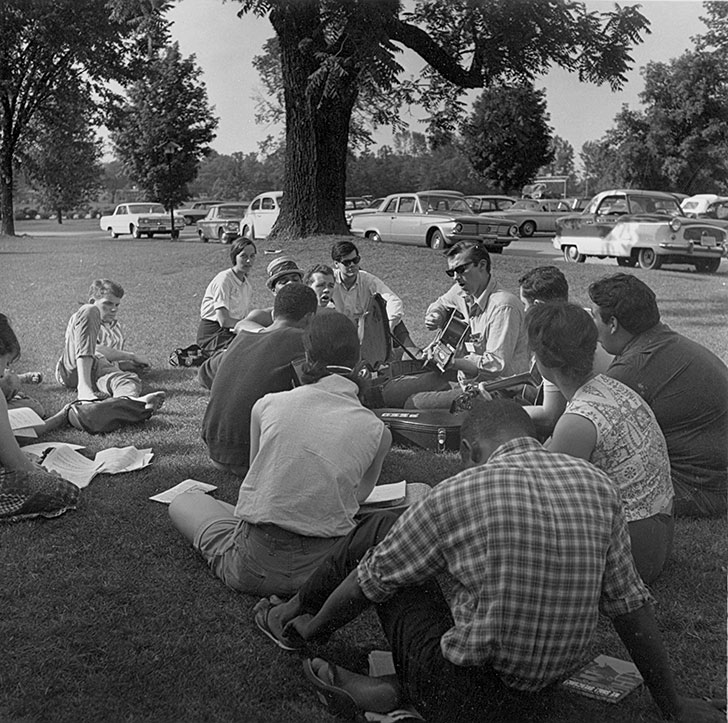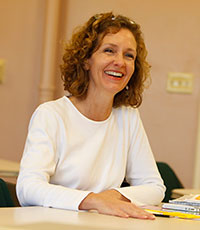
Interactive app and Web-based game will share the story of Freedom Summer

Volunteers sing freedom songs on the lawn in front of Clawson Hall in 1964. Photograph by George R. Hoxie; courtesy of Smith Library of Regional History
Written by Margo Kissell, university news and communications, kisselm@miamioh.edu
A Miami University theatre professor has been awarded a $59,994 grant from the National Endowment for the Humanities to develop a prototype for a location-based game about the role Western College for Women (now Miami's Western campus) played in Freedom Summer.
Ann Elizabeth Armstrong, associate professor of theatre, said the digital startup funds will be used to create an app and a Web-based game for her project, "Orientation to the Mississippi Summer Project: An Interactive Quest for Social Justice."
Both versions will interpret the Mississippi Summer Project, which later became known as Freedom Summer, on the site of the 1964 orientation at Western College for Women. More than 800 volunteers gathered there to train for civil rights activism in Mississippi.
Armstrong hopes to incorporate actual photos and footage from that time to help bring the story to life for a new generation of people not familiar with the history.

Ann Elizabeth Armstrong
"As we see today with games and learning and all kinds of interactive media, this is a way to increase the kind of audience we're telling the story to," she said.
App users will be able to play the game as they walk around Western campus and interact with the buildings and landscape. For those who are not on campus, the Web-based game will offer the same interactive experience.
Armstrong's two co-primary investigators on the project are Bob De Schutter and Elias Tzoc.
De Schutter, a C. Michael Armstrong Assistant Professor for Armstrong Interactive Media Studies and in the College of Education, Health and Society, will help design the game.
Tzoc, a digital initiatives librarian in the Center for Digital Scholarship for University Libraries, will provide the backend development (such as programming), technical support as well as record different revisions of the game and how people interact with it.
The project team will use the open source platform Augmented Reality Interactive Storytelling (ARIS) to create the location-based app, which would allow them to put characters in the landscape, Armstrong said. Even the person playing the game would have a role: a volunteer arriving at orientation.
"We're kind of using the premise: You've come, now you have to learn as a way of teaching some context of the civil rights movement," Armstrong said. "We can use it as a learning moment."
Those playing the game may be asked to complete certain tasks and collect virtual objects, she said.
Armstrong, with the assistance of six Miami students, created in 2004 the "Walk With Me" Freedom Summer Walking Tour, a student-led interactive experience on Western campus. The project was developed further by the Center for American and World Cultures and a 2009 NEH Interpreting America's Historic Places planning grant.
The Miami University Humanities Center's Digital Humanities Work Group supported Armstrong in writing this latest grant.
Armstrong said the project brings together historians, game designers, other Miami faculty, civil rights participants, high school teachers and professionals from the National Underground Railroad Freedom Center and the new Mississippi State Civil Rights Museum.
They hope to have a prototype for the app ready by Sept. 1 and then will test it and gather feedback. They aim to have it ready for public use in time for Miami's Freedom Summer National Conference Oct. 12-14.
"After October, we'll start to imagine what a Web-based game looks like," Armstrong said, adding they hope to have a prototype ready by spring 2015.
